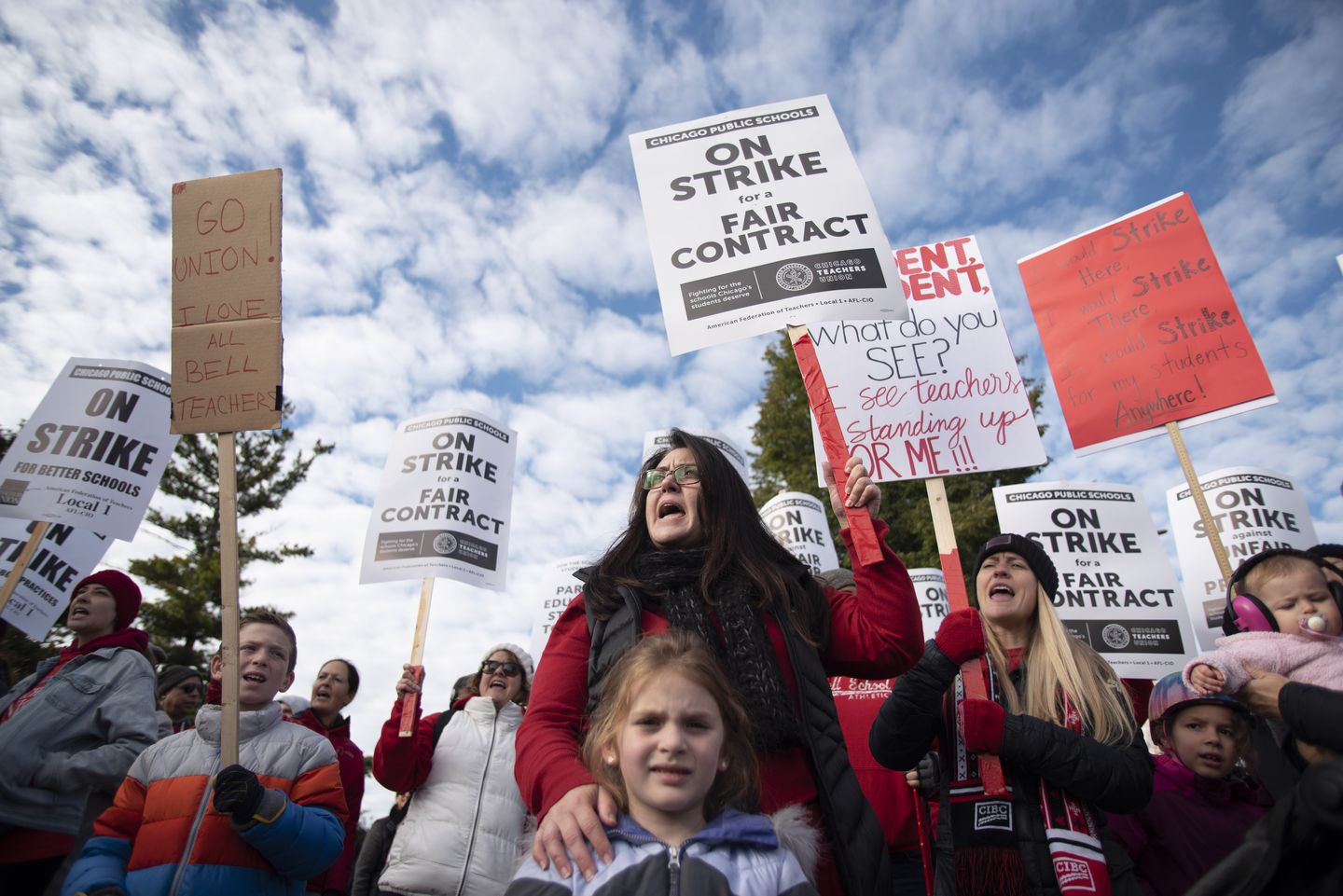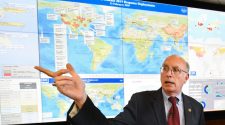Teachers throughout the nation are battling for classroom resources, affordable housing and restrictions on charter schools. During the last two years, educators in unlikely places have found their voices, walking out in 2018 in red states such as West Virginia, Oklahoma and Arizona, buoyed by broad-based public support.
In January, teachers in Los Angeles, the nation’s second-largest school system, went on strike amid a battle with district leaders over crowded classrooms, depleted staff and the very future of the city’s schools. West Virginia teachers left their classrooms again this year, defeating a measure that would have permitted charter schools, which are publicly funded but privately operated.
Several teachers successfully ran for public office last year, taking key posts in state legislatures with the promise of restoring school funding.
Chicago teachers, represented by a powerful union in an overwhelmingly Democratic city, last went on strike in 2012. Thursday’s strike idled some 25,000 teachers and 300,000 students.
“You see a common thread from West Virginia to Los Angeles to Chicago,” said Randi Weingarten, president of the American Federation of Teachers, the nation’s second-largest teachers union. “It’s about making the sacrifice to help create welcoming and safe environments for our kids and not taking ‘no’ for an answer.”
The Chicago Teachers Union and Mayor Lori Lightfoot, who faces her first major test as the city’s leader, reached a contract impasse, forcing Lightfoot to cancel classes Thursday. Teachers were joined on the picket lines by special education assistants, bus aides, school security guards and other staff represented by Service Employees International Union Local 73, whose contract negotiations with the city also stalled.
Lightfoot has said the city cannot afford the teachers’ demands, which include a restorative justice coordinator for every school. She told reporters Thursday morning that schools would remain closed until teachers agreed to come back to the classroom.
Leslie Russell, an English teacher at Walter Payton College Preparatory High School who joined the massive rally, said she sees stark disparities between city schools and campuses in more affluent suburbs. Her school has a nurse only one day a week.
“Teachers are not in it for the money,” Russell said. “We are the catalyst for great things kids can do when in optimized conditions.”
Thursday morning, leaders from the Chicago Teachers Union continued negotiations with city officials at Malcolm X College on the Near West Side. Union president Jesse Sharkey told the Chicago Sun-Times that it was unlikely the two sides would strike a deal imminently.
Some who joined teachers on the picket line said they are battling to force Lightfoot to hew to her campaign platform, which emphasized educational justice.
“The mayor ran on a platform of racial and social equity,” 35th Ward Alderman Carlos Ramirez-Rosa told teachers and community members gathered outside Avondale-Logandale Elementary on Chicago’s Northwest Side. “She forgot her campaign promises. You will make her remember.”
About 60 people stood outside the school Thursday morning, waving signs that read “Teachers and students sacrifice too much” and “35 is a speed limit, not a class size.” Passing motorists honked in support.
In addition to bread-and-butter issues, teachers are hoping to force the city to commit to easing a housing crisis that has driven out many of the city’s black residents. More than 16,000 students were counted as homeless in 2018. It means teachers, in addition to educating students, often have to ensure their basic needs are being met.
Lightfoot, who won a landslide victory in April, said at a Wednesday news conference she was dismayed by the union’s job action.
“I was disappointed by the CTU’s decision to begin a work stoppage and force the cancellation of classes,” Lightfoot said. “I feel like we rolled up our sleeves and negotiated in good faith over a long period of time.”
“We reiterated that our proposal was rooted in our admiration for the job that educators and school staffers do every day,” the mayor said.
Elementary special-education teacher and union delegate Katie Osgood recalled working at a school where she had a special education student who was homeless and slept in shelters on the weekend.
“We had to find out if she had food and clean clothes,” Osgood said. “This is what our little guys deal with.”
Destiny Harris, a 2019 graduate of Whitney M. Young Magnet High and an activist, battled the city for months as it prepared to turn a shuttered school into a police academy. She said it was emblematic of how the city prioritized resources.
“Chicago Teachers Union is demanding that students be treated like they matter,” said Harris, now a freshman at Howard University.
Adesuwa Obazee, a preschool teacher at Avondale-Logandale Elementary, said the dearth of resources and staff force teachers to wear multiple hats: They have to comfort students, make them feel safe and sometimes serve as social workers and nurses. The school nurse visits the school just once a week.
“We do it all,” Obazee said.
In 2012, teachers battled with then-Mayor Rahm Emanuel, pushing back on his efforts to institute merit pay, tie teacher evaluations to standardized test scores and expand charter schools. It made the city a focal point in the debate over an education policy that favored charter schools and evaluating teachers through standardized testing, and strained the relationship between Emanuel and the union. Teachers nearly went on strike again in 2016, narrowly averting a job action with a last-minute compromise.
Catherine Dalber, a preschool teacher at Lawndale Elementary Community Academy on Chicago’s West Side, said educators confront poverty and stress in their classrooms.
“Everyday we go to work the stress level is sky high. The kids are not ready to learn, they suffer a great deal of trauma, they are hungry and tired,” Dalber said.
“I can’t do every job.”
Kim Bellware contributed to this report. Balingit and Bellware reported from Washington.


-187x125.jpg)











